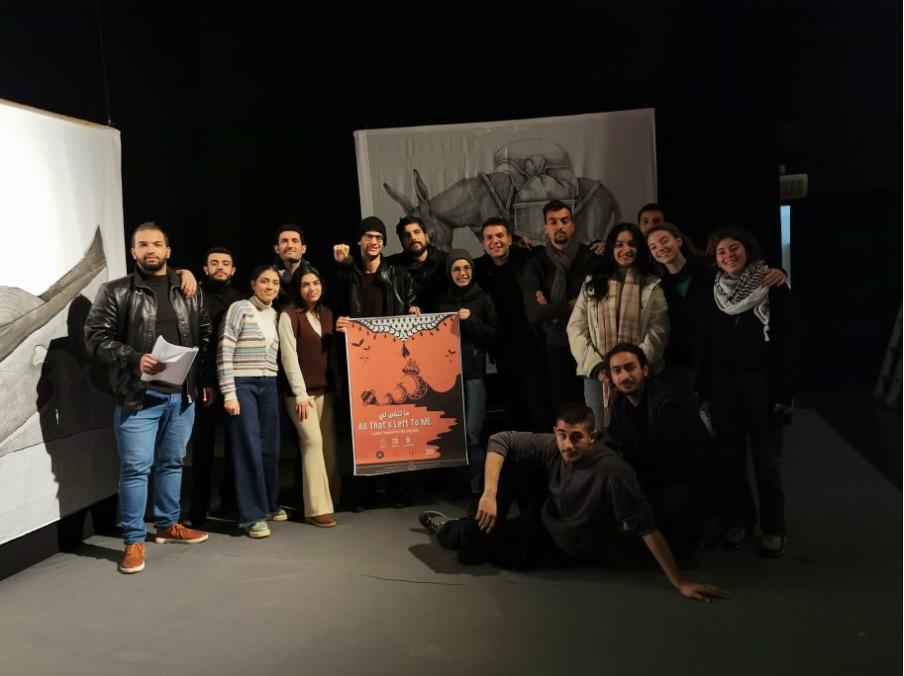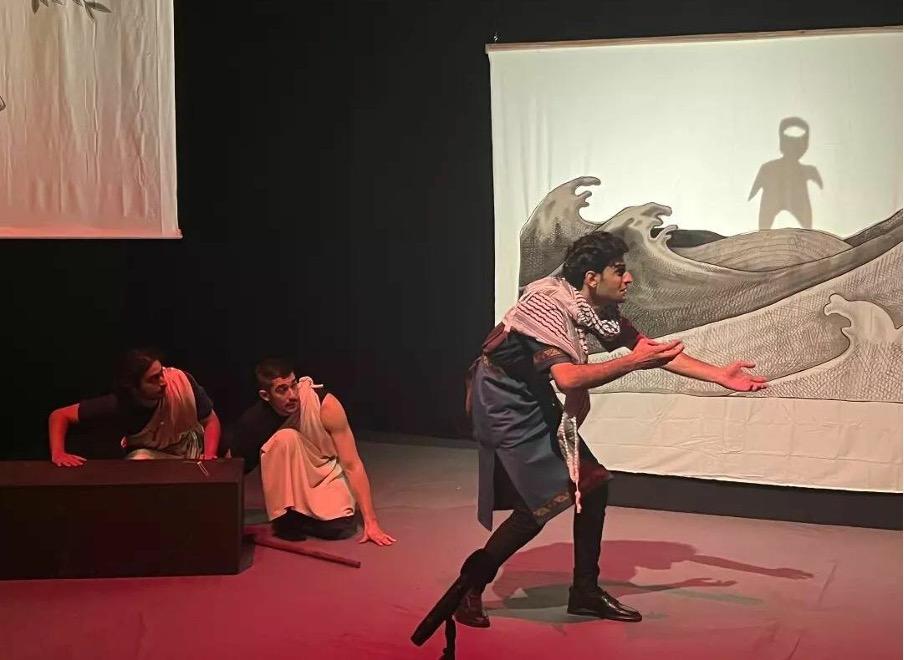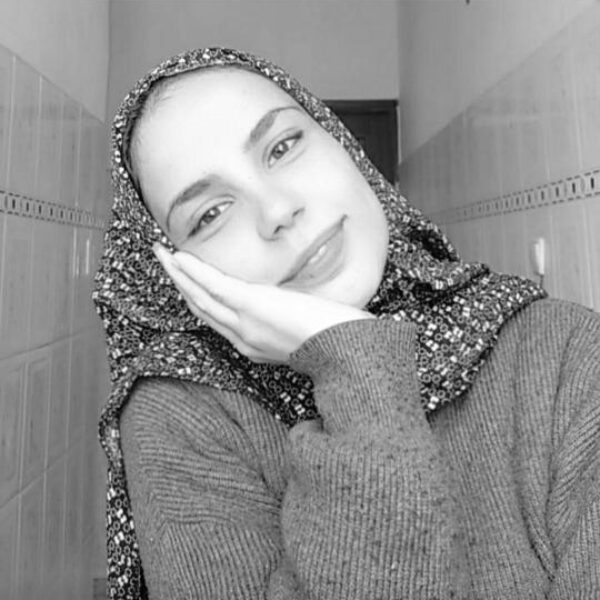Previously published in the website “We Are Not Numbers” March 16, 2024. Cover photo: Abraham Saidam rehearses “All that’s left to me”, not long before being killed in an Israeli bombing campaign.
Ala’a Sbaih
March 16, 2024
When I was grappling with life’s rejection of my dreams, I watched the final episodes of Maid, a television series on Netflix. That series was good for my psyche, because the protagonist was suffering from life’s confusions just like me. On the show, the main character received notification that she was accepted into a university. I was watching it at the same time that I was accepted into a theater project, so I took this coincidence as a sign that it would change my life.
I always dreamed of writing a script for a film, so I wanted to take advantage of this opportunity to learn more about the theater. I was thrilled every day working on this project, and I met inspirational people with whom I became close friends.

One of them was a tall, slim fellow with black glasses: Abraham Saidam, the punctuality guy, who never missed a meeting. The first time I sat with him was when we were writing about the hero’s character in the play. We were the only ones who wanted a dramatic ending, so the first thing we said before writing anything was, “The protagonist has to die.” After we discussed a lot and wrote together for a while, I saw that we shared many interests.
We both are cinéphiles, so we wanted to open our new brand. He named it “A’s”, the letter that our first and last names begin with. We wanted to put our favorite clips and phrases from movies on shirts and tops that would share our taste and style.
Abraham was the cameraman of our group, and one of his biggest dreams was to film a movie. I told him that I wanted to make a short film called The Friendship Gap, based on my own script, and I wanted him to film it. He liked the idea and we decided to film it when we were traveling to Italy in October. We were going there with our theatre group to perform the play the group had developed, called All That’s Left to Me, an adaptation of Homer’s Odyssey.
Once, Abraham said to me, “Your head is full of different ideas and you can say them at the same moment and that is a good thing.” That’s what I was doing at that time; despite all the circumstances that I was enduring, I was so busy with a new job, on top of planning to travel to Italy, that my head was about to explode because of the pressure.
Abraham stood by me for hours and helped me fill out the visa application. When we finished, he headed to his company and I went to my house. However, I got a phone call telling me that there was a mistake on the flight date, so I phoned Abraham. By the time I went to his office, he had already corrected the date.
I accidentally printed his papers for the visa and he asked me to keep them with me as a souvenir. Oct. 1 at 3 p.m. on Al Wahda Alfien Street was the last time I saw him. “Ciao,” he said. “See you in Milan.”
On Oct. 7, I woke up with such excitement. I was going to go shopping with my friend to buy all the stuff I needed for the trip, my first trip out of Gaza. I wanted to make everything perfect. I was a little bit nervous about how I was going to ask my boss for three weeks off, since I’d only been working for five weeks.
Then I heard the sounds of missiles. My heart started beating fast. Now I could only think about war. I hate war. Scars remain from the last two wars, and they begin to bleed with every beginning of a new war.
For a moment I felt that I was about to live the life I have always wanted: a job, friends I love so much. To travel to Italy to perform our play in three cities, and to work on my film. But here we go again with war, the cursed choice written to end our desires in this life.
I could not have imagined that I would lose one of the members of the theater group, and that the one lost would be the most ambitious, passionate person I have ever met. One who respected women the most, who loved his sister the most, who made us laugh about his childhood memories, the one who talked a lot about death. The hero of our play, Abraham. Despite his ambitions and hard work, he always said, “There is nothing better than death.”

He wanted to write the monologue for the protagonist, the character he wanted to play, and now I can understand he meant every single word he wrote. When I learned about his death, the first thing I remembered was the last sentence in his last scene on stage before his character died: أنت منذ الآن غيرك, which means “From now on, you are another person.”
After what happened on Oct. 7, we’re no longer the same people we used to be.
Abraham loved Gaza and wanted to make a lot of movies to tell people about her. He always wanted peace and never loved war. What is left from him are beautiful moments and memories. None of what Abraham and I wanted was completed, even the play that we were working on; the actor playing the character who dies at the end of the play, died before the play could even start.
Since the beginning of this war, my family has been distracted. My father is not with us, my sisters have evacuated to the south, as with all my friends. If I miss one of them, I cannot see them or talk with them because of the bad connection. I find myself engaged in a frustrated spot, unwillingness to exist is all I think about so everything in my mind is about how I will die, and what my last words will be. Will I die from a missile, fear, hunger, or pain?
I’ve decided to keep silent, so the flame of my questions and worries are extinguished. I just live my day by waking up and falling asleep.
Then I write:
In the symphony of twilight, where shadows waltz with fleeting light,
I traverse the corridors of my soul, seeking solace in the quiet night,
Beseeching the heavens, pondering if these are my final deeds in life
A silent plea resonates, questioning God,
Why some souls have to test death with all its forms so many times,
To when this life (*Land*) will be enough of perdition.
With each attempt to grasp the essence of existence,
The echoes of war leave indelible imprints, a somber signature,
That merges a thousand of yesterday’s memories with dawn anew.
Survival becomes a dance with shadows, witnessing the ebb of lives,
Perhaps I’ve glimpsed mine (I mean here my death)
Yet, beneath the weight of existential quandaries, a fragile hope persists,
A poetic resilience that whispers, “Live on,” as the soul perceives
A time when all sorrows are postponed.
Writing is what makes my thoughts so balanced, even though it’s tough, but that is all I can do.
Mentor: Philip Metres

Ala’a Sbaih holds a degree in English and French literature. Oct. 7 was the day when one of her dreams didn’t come true, as she was supposed to travel in the first week of that month to Italy to perform in a play, a Palestinian adaptation of Homer’s Odyssey. The show was canceled, and the actor playing the hero of the play was killed in an Israeli airstrike. “As Gazans,” she writes, “we’re people whose stories aren’t complete and whose ambitions aren’t realized, and everything we try to build anew is crushed from its root after years, and the end of our path is always known.”





















































